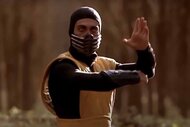Create a free profile to get unlimited access to exclusive videos, sweepstakes, and more!
Women of esports: Anna Baumann, managing director and general counsel of Rogue EU

In our continuing series on women of esports, we're chatting with Anna Baumann, managing director and general counsel of Rogue EU. Baumann resides in Heidelberg, Germany, and as a student she fell in love with World of Warcraft, which began her love of gaming. She is an avid League of Legends player and a lawyer working in the esports arena. Baumann tells SYFY FANGRRLS all about the legal side of this fairly young sport, the differences between esports in Europe and America, and what players can ask for these days.
You've said that you started in gaming with World of Warcraft. We'd love to hear about what the draw was, if you play Alliance, Horde, or both, and what types characters you have.
World of Warcraft came into my life in 2002, when I was studying law abroad in Bologna, Italy. The sensation of entering this beautiful, imaginative world in which you could connect with people from all over the world was thrilling, as WoW was the first game of its kind on such a large scale. Coordinating raids or PvP events with hundreds of people without any infrastructure or known tactics was very exciting; it felt like conquering the unknown. For that journey, I chose an undead warlock named “Katla,” after the evil dragon in a children’s book by Astrid Lindgren. It was always “for the Horde.” I really enjoyed merging with this alter ego in a fantasy world at night as a contrast to my daily high-performance/high-pressure environment. Even back then, it was obvious that online gaming connects people beyond borders or any other dividing factors, thriving to achieve success together and enjoying this deep sense of community. I couldn’t be happier that online gaming has left its negative connotation behind and esports has arrived in the middle of society, as the modern form of competition in a digital environment.
Can you give us a look at the differences between esports in Europe and the United States?
Generally, esports look very similar between Europe and the U.S. due to esports being a global phenomenon. This results in similar esports being successful on both sides of the pond, such as League of Legends, Counterstrike: Global Offensive, and Overwatch. Structurally, the ecosystems around esports are built similarly in both regions; for example, Riot takes the approach with a franchised league in League of Legends — in Los Angeles in the U.S. with the LCS and in Berlin, Germany, with the LEC. As a contrast, Valve fosters open competition between tournament organizers for CS:GO, which results in tournament series being held all over the globe.
From a legal perspective, the biggest difference probably can be seen around player protection levels, which derive from general employment law premises. While most European countries provide strict worker protections around social security contributions, insurances, and termination, the US allows for more flexibility for employers. Additionally, it is always interesting to me how US law allows IP rights holders such as game developers to leverage their rights fully in order to coordinate the markets deriving from their IP rights. This usually results in more one-sided agreements between game developers and other industry participants than it does in the EU where other rights around data privacy and worker protection might force a more proportionate approach.
As a lawyer for esports, we'd love to hear a few examples of the type of cases you might take on.
The most exciting and rewarding cases have always been those where I represented players and helped them shape their careers. I am probably most proud of a case where I represented players who had received a life-long ban by a game publisher for one instance of match-fixing in the very early days of esports. While match-fixing is undoubtedly a terrible offense against competitive integrity, the industry didn’t have any fair and transparent measure in place to deal with incidents like this appropriately. For example, in traditional sports, you would probably face a tribunal and could rely on due process and other principles of law, but in esports, it is mostly the game publisher protecting its product by any means possible. In my case at hand, we achieved a reduction of the ban to two years in the end which was a big win towards a fairer approach overall.
I have also represented many premier esports teams, shaping the relationships between league organizers, game publishers, and teams. Before I recently switched sides to work for team Rogue as Managing Director in the LEC franchise, my practice was mostly focused on big sponsorship deals between brands and esports stakeholders as well as assisting private equity deals around esports teams and data companies. Now I am very grateful that Amish Shah, founder and chairman of Rogue’s parent company, ReKTGlobal, and Dave Bialek, CEO of ReKTGlobal, allow me to let our joint vision of esports come to life as managing director of Rogue Europe and let me still pursue my passion with esports law as general counsel at the same time.
How has the law changed in esports (as well as the landscape) since you started in the industry?
When I started my practice in 2015, the legal landscape was fairly underdeveloped - it was non-existent. Governments were not aware of this new societal phenomenon and the industry back then was still in its infancy which resulted in a severe lack of compliance and good structures.
In the meantime, teams have developed from family-run businesses into multi-million global brands and esports players earn seven figures per year. With this rapid growth, regulation, as well as infrastructure, has developed rather quickly. There are multiple law firms out there in almost every country servicing esports clients side by side to their sports clients, making sure the landscape improves quickly and the foundations for a sustainable industry are built. Besides, many governments have recognized esports as important societal and business factor which has resulted regulation aiming at improving the standards of the industry, in France, for example, tournament organizers have to provide a guarantee of prize money if they want to acquire a permit by local authorities.
How have player rights and best practices changed?
In 2015, players had very little understanding of their position in the industry and attached rights. Contracts without any compensation, no compliance with labor laws and one-sided exploitation of their brand and image seemed to be the standard. At the very top of any esports competition, the contrast could not be bigger these days. Players are represented by agents and lawyers, making sure to negotiate for fair compensation, carving out rights for the players to market him- or herself and shaping careers in a sustainable way. Of course, players’ rights go beyond the individual contract with a team. On a broader scale, players are now even organizing themselves globally to improve their bargaining power against teams and tournament organizers. A strong representation of players’ rights will help to build sustainable ecosystems for sure!
What sort of things can players ask for now? People are more familiar with contracts for traditional sports so it would be great to get some insight into the power that they have on the gaming side of things.
Money always seems to be on top of the list. Of course, travel standards are also important as many players’ families live abroad but we are still far away from players demanding regular vacation with their entire entourage. Some of the clauses are focused on performance, for example using their own gear despite a gear sponsor for the team. Another area which has developed a lot is around termination clauses and severance payments. Given the high level of uncertainty of this career, I believe we have made great progress providing players with better conditions in case things don’t work out with a team.
League of Legends is a game we hear brought up in most of our interviews. What is it about that game that you love?
League of Legends is a brilliant example of a great esports: low barrier of entry and a high skill ceiling. I play quite a bit myself and I enjoy how you can choose a champion and a role in a team which first your play style and character preferences. My main is Nami which is a character which is quite versatile. On top of it, I love the highly competitive character of the game even on amateur levels. Lastly, I believe Riot has created a great competitive circuit which attracts viewers across all generations. It is absolutely heart-warming to see parents going to games together with children, acknowledging their children’s passion as well as the entertainment factor. These are only the beginnings of a severe shift of entertainment towards the digital and League of Legends is at the forefront of that!
What advice do you have for other people who want to get into this side of the industry?
Esports is growing at an insane speed and there is a huge need for dedicated, skilled and passionate people who can help this industry grow even more. Very much like anywhere else, I would recommend reaching out to companies, applying for internships or asking for open positions. Don’t be afraid to get in contact with prominent industry figures directly, you might be surprised how easy it is to get in touch. Growing your esports network, going to events and getting to know people who work in esports personally might help a lot, too. Lastly, if you are passionate about the law and esports, apply at law firms who already work with clients in esports — or reach out to game publishers, teams or other stakeholders to get to know the in-house counsel perspective!


























